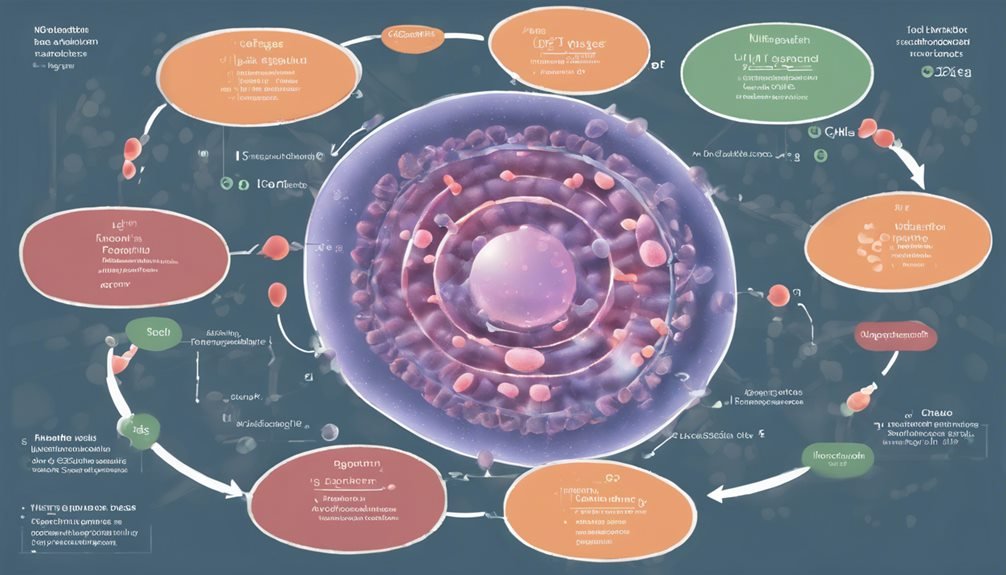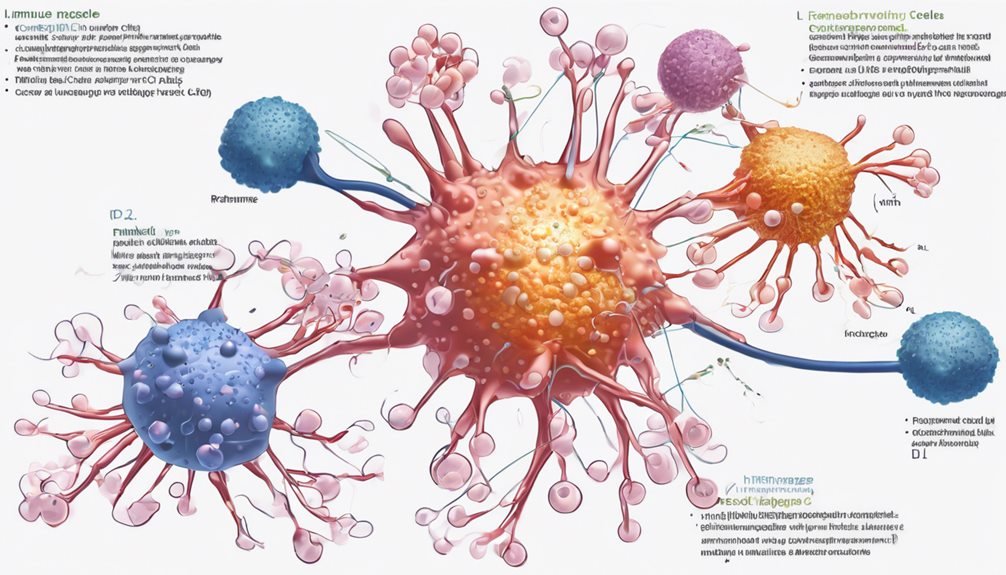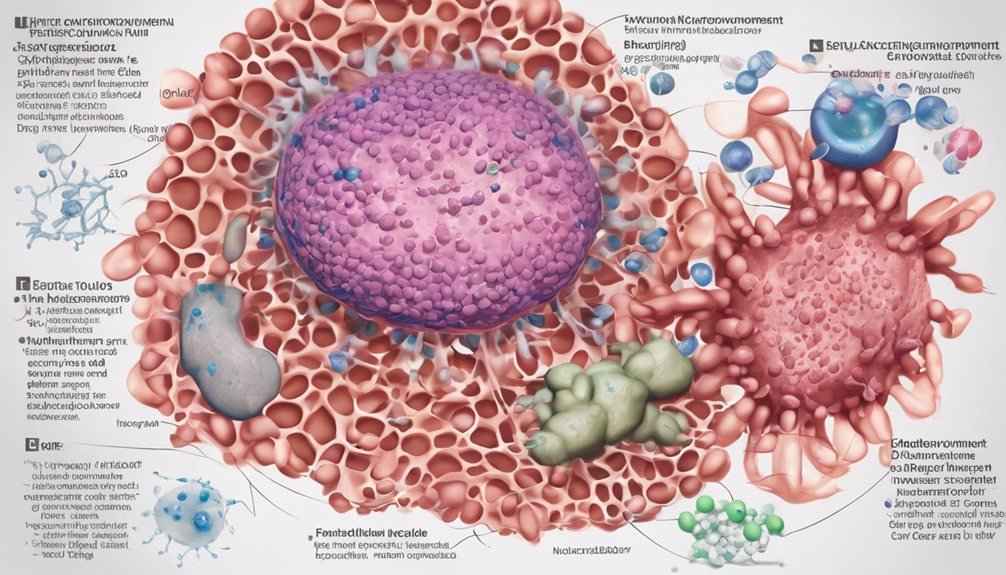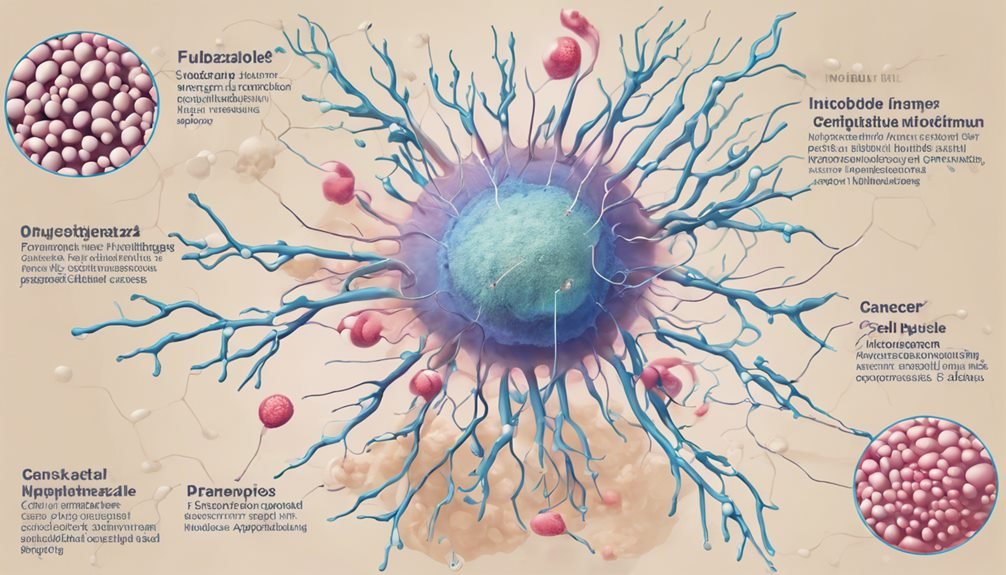When considering the mechanisms behind Fenbendazole's anti-cancer activity, one cannot overlook its intricate interplay with various cellular processes that drive tumorigenesis. From disrupting microtubule dynamics to impacting tumor angiogenesis and immune modulation, the multifaceted actions of Fenbendazole pose intriguing questions about its full potential in cancer therapy. As you explore the intricate pathways through which Fenbendazole exerts its anti-cancer effects, you may uncover a deeper understanding of its role in combating cancer beyond conventional treatments.
Key Takeaways
- Disrupts microtubule dynamics in cancer cells, inhibiting proliferation.
- Induces apoptosis via caspase activation, reducing cancer cell survival.
- Modulates immune system, enhancing defense against cancer cells.
- Targets angiogenesis, restoring balance in tumor microenvironment.
- Enhances efficacy in combination therapies, improving treatment outcomes.
Fenbendazole's Mode of Action
Understanding the mode of action of Fenbendazole is crucial in unraveling its anti-cancer properties. This drug, commonly used as an anthelmintic in veterinary medicine, has garnered attention for its potential therapeutic effects in cancer treatment. Fenbendazole exerts its anti-cancer activity through intricate molecular mechanisms that impact cancer cells.
Research suggests that Fenbendazole may target microtubule dynamics within cancer cells, disrupting cell division and inducing apoptosis. By binding to tubulin proteins, Fenbendazole interferes with the assembly of microtubules crucial for cell division, ultimately leading to cell death. This unique mechanism highlights the drug's potential in inhibiting the proliferation of cancer cells and suppressing tumor growth.
The therapeutic potential of Fenbendazole lies in its ability to specifically target cancer cells while sparing normal cells. By exploiting the vulnerabilities of cancer cells at the molecular level, Fenbendazole shows promise as a potential adjunct therapy in cancer treatment regimens.
Further research into the precise molecular mechanisms underlying Fenbendazole's anti-cancer effects could unveil new avenues for combating cancer effectively.
Inhibition of Cancer Cell Proliferation
With its ability to disrupt microtubule dynamics and induce apoptosis in cancer cells, Fenbendazole plays a crucial role in inhibiting the proliferation of cancer cells. The drug interferes with crucial cell signaling pathways involved in tumor growth, ultimately leading to decreased cancer cell division and growth.
| Mechanism | Action | Effect |
|---|---|---|
| Disruption of microtubule dynamics | Interferes with cell division | Inhibits cancer cell proliferation |
| Induction of apoptosis | Promotes programmed cell death | Reduces cancer cell survival |
| Inhibition of cell signaling pathways | Blocks pathways essential for tumor growth | Suppresses cancer cell proliferation |
Effects on Cell Cycle Regulation

To elucidate the impact of Fenbendazole on cancer cells, focus must shift towards its effects on cell cycle regulation. Fenbendazole has been shown to influence cell cycle checkpoints, which are crucial for maintaining proper cell division and preventing uncontrolled proliferation. By targeting regulatory proteins involved in these checkpoints, Fenbendazole can disrupt the orderly progression of the cell cycle in cancer cells.
One key aspect of Fenbendazole's mechanism is its ability to interfere with the activity of regulatory proteins that govern the cell cycle. These proteins play a vital role in ensuring that cells divide accurately and at the right time.
When Fenbendazole disrupts these regulatory proteins, it can lead to cell cycle arrest, preventing cancer cells from proliferating uncontrollably.
Induction of Apoptosis in Tumor Cells
Inducing apoptosis in tumor cells is a critical mechanism through which Fenbendazole exerts its anti-cancer effects. Apoptosis regulation, the programmed cell death process, plays a crucial role in eliminating abnormal cells to maintain tissue homeostasis. Fenbendazole has been shown to promote tumor cell death by triggering apoptosis pathways within cancer cells. This process involves activation of caspases, which are enzymes responsible for initiating the cellular dismantling process in a controlled and organized manner.
By inducing apoptosis in tumor cells, Fenbendazole effectively targets and eliminates cancerous cells, inhibiting their growth and spread.
Tumor cell death through apoptosis induction is vital for preventing the uncontrolled proliferation of cancer cells. Fenbendazole's ability to modulate apoptosis regulation pathways highlights its potential as an anti-cancer agent. Understanding how Fenbendazole influences apoptosis in tumor cells provides insight into its mechanisms of action and underscores its significance in combating cancer.
Further research into the specific molecular interactions involved in Fenbendazole-induced apoptosis could unveil novel therapeutic strategies for cancer treatment.
Impact on Tumor Angiogenesis

Fenbendazole's impact on tumor angiogenesis is a crucial aspect of its anti-cancer activity. Angiogenesis, the formation of new blood vessels, is a hallmark of cancer progression, providing nutrients and oxygen to support tumor growth and metastasis.
Fenbendazole has been shown to influence tumor angiogenesis by targeting the angiogenic switch, which is the shift towards a pro-angiogenic state in the tumor microenvironment.
One significant mechanism through which fenbendazole impacts tumor angiogenesis is by promoting vascular normalization. This process involves restoring the balance between pro-angiogenic and anti-angiogenic factors in the tumor vasculature, leading to improved blood flow and oxygen delivery.
Disruption of Cellular Metabolism
The disruption of cellular metabolism is a pivotal aspect of fenbendazole's anti-cancer mechanism. When this medication interferes with metabolic pathways in cancer cells, it leads to profound effects on their growth and survival. Here's how fenbendazole achieves this:
- Downregulation of Glycolysis: Fenbendazole inhibits key enzymes involved in glycolysis, the process through which cancer cells generate energy. This disruption starves cancer cells of the fuel they need to proliferate.
- Interference with Oxidative Phosphorylation: By disrupting oxidative phosphorylation, fenbendazole impairs the cancer cells' ability to produce energy efficiently, leading to decreased cellular signaling and growth.
- Altered Lipid Metabolism: Fenbendazole influences lipid metabolism, affecting the synthesis of lipids crucial for cell membrane formation and signaling pathways.
- Impact on Amino Acid Metabolism: This medication also interferes with amino acid metabolism, crucial for protein synthesis and cellular signaling, further hindering cancer cell proliferation and survival.
Fenbendazole's multifaceted disruption of cellular metabolism showcases its potential as a promising anti-cancer agent.
Immune Modulation by Fenbendazole

Immune modulation plays a crucial role in fenbendazole's mechanism of action against cancer. Fenbendazole has been shown to modulate the immune system, impacting tumor progression and the body's ability to fight cancer. By influencing the inflammatory response, fenbendazole can potentially enhance the body's natural defenses against cancer cells.
Research suggests that fenbendazole may help regulate the immune response by promoting the activation of immune cells that target and destroy cancer cells. This modulation of the immune system can lead to a more robust anti-cancer effect, potentially slowing down tumor growth and progression.
Furthermore, immune modulation by fenbendazole can also have implications for cancer treatment. By enhancing the immune response, fenbendazole may complement traditional cancer therapies, such as chemotherapy and immunotherapy. This synergistic effect could improve treatment outcomes and patient responses to therapy.
Understanding the immune-modulating properties of fenbendazole is essential for harnessing its full potential in combating cancer and developing novel therapeutic strategies.
Synergistic Effects With Other Therapies
Studies have indicated that fenbendazole demonstrates synergistic effects when combined with other cancer therapies. This synergism can be crucial in overcoming treatment resistance and improving overall treatment outcomes. Here are some key points to understand the synergistic effects of fenbendazole when used in combination therapies:
- Enhanced Efficacy: Fenbendazole has been shown to enhance the efficacy of conventional chemotherapeutic agents when used together, leading to increased cancer cell death.
- Reduced Side Effects: Combinations of fenbendazole with other therapies have the potential to reduce the toxic side effects commonly associated with traditional cancer treatments.
- Overcoming Resistance: By targeting cancer cells through different mechanisms, fenbendazole in combination therapies can help overcome resistance that may develop against single-agent treatments.
- Improved Survival Rates: Studies suggest that combining fenbendazole with other therapies may lead to improved overall survival rates in cancer patients, offering new hope in the fight against the disease.
These findings highlight the importance of exploring combination therapies involving fenbendazole to combat treatment resistance and enhance treatment efficacy in cancer patients.
Targeting Cancer Stem Cells

Among the various approaches to combat cancer, targeting cancer stem cells has emerged as a promising strategy due to their role in tumor initiation, progression, and treatment resistance. Cancer stem cells possess the ability to self-renew and differentiate into various cell types, contributing to tumor heterogeneity.
By targeting these cells, therapies can aim to disrupt their self-renewal capacity and induce their differentiation, ultimately hindering tumor growth and metastasis. Fenbendazole has shown potential in impacting cancer stem cells by promoting stem cell differentiation, leading to reduced tumorigenicity.
This mechanism addresses the root cause of tumor development, potentially offering a more effective long-term treatment approach. Additionally, the targeting of cancer stem cells may help overcome treatment resistance commonly seen in cancer patients.
Understanding the intricate mechanisms involved in stem cell differentiation and tumor heterogeneity is crucial for developing therapies like fenbendazole that can specifically target and inhibit cancer stem cell populations, providing hope for improved cancer treatment outcomes.
Influence on Tumor Microenvironment
The tumor microenvironment plays a critical role in influencing cancer progression and treatment response. Fenbendazole's influence on the tumor microenvironment can lead to significant modulation of immune responses and interactions with stromal cells. Here are some ways in which Fenbendazole impacts the tumor microenvironment:
- Immune Cell Activation: Fenbendazole has been shown to enhance the activation of immune cells within the tumor microenvironment, leading to improved anti-tumor immune responses.
- Stromal Cell Regulation: Fenbendazole can influence the behavior of stromal cells, which are non-cancerous cells that provide structural support to the tumor. This modulation can alter the tumor microenvironment dynamics.
- Cytokine Production: Treatment with Fenbendazole may affect the production of cytokines within the tumor microenvironment, influencing the communication between different cell types.
- Angiogenesis Inhibition: Fenbendazole has demonstrated the potential to inhibit angiogenesis within the tumor microenvironment, disrupting the formation of new blood vessels that are crucial for tumor growth and metastasis.
Role in Preventing Metastasis

Fenbendazole's impact on the tumor microenvironment extends to its potential role in preventing metastasis, a critical aspect of cancer progression. Metastatic progression, the spread of cancer cells from the primary tumor to distant organs, is a major challenge in cancer treatment. Research suggests that fenbendazole may play a role in inhibiting this process by targeting key pathways involved in metastasis.
Studies have shown that fenbendazole can modulate signaling pathways related to cell migration, invasion, and angiogenesis, all of which are essential for the metastatic spread of cancer cells. By disrupting these pathways, fenbendazole may impede the ability of cancer cells to invade surrounding tissues and establish secondary tumors at distant sites.
The potential of fenbendazole to prevent metastasis has significant therapeutic implications. If proven effective in clinical settings, fenbendazole could be used as an adjuvant therapy to complement existing treatments and reduce the risk of metastatic disease.
Further research is needed to elucidate the precise mechanisms underlying fenbendazole's anti-metastatic effects and to explore its full potential in cancer management.
Clinical Implications and Future Directions
Exploring the clinical implications and future directions of fenbendazole's anti-cancer activity involves a comprehensive evaluation of its potential impact on treatment outcomes and patient survival. To maximize its therapeutic potential, consider the following:
- Clinical Trials: Initiate large-scale clinical trials to assess fenbendazole's efficacy across different cancer types.
- Novel Combinations: Investigate synergistic effects when combining fenbendazole with traditional chemotherapy or immunotherapy agents.
- Drug Resistance: Study the mechanisms underlying fenbendazole's ability to overcome drug resistance in cancer cells.
- Biomarker Identification: Identify specific biomarkers that can predict patient response to fenbendazole treatment, enabling personalized medicine approaches.
Frequently Asked Questions
Can Fenbendazole Be Used in Combination With Traditional Chemotherapy?
You can explore using fenbendazole in combination with traditional chemotherapy through clinical trials. This approach could potentially broaden treatment options for cancer patients. By studying the effectiveness and safety of this combined treatment strategy, researchers aim to enhance patient outcomes and offer more personalized and effective therapies. Clinical trials play a vital role in assessing the feasibility and benefits of such combinations, ultimately contributing to advancements in cancer care.
What Is the Recommended Dosage of Fenbendazole for Cancer Treatment?
For optimal dosing in cancer treatment, efficacy studies suggest a recommended dosage of fenbendazole. Consult with healthcare professionals to determine the most appropriate amount tailored to your specific condition.
Research indicates that precise dosing is crucial for the effectiveness of fenbendazole in combating cancer cells. Stay informed about the latest findings and guidelines regarding fenbendazole dosages for cancer therapy to maximize its potential benefits.
Does Fenbendazole Have Any Side Effects on Healthy Cells?
When considering fenbendazole's effects, it's essential to evaluate potential risks on healthy cells. While fenbendazole primarily targets cancer cells, some studies suggest it may also affect normal cells. Side effects reported include mild gastrointestinal issues and potential liver toxicity. Understanding these risks is crucial for determining the overall impact of fenbendazole treatment on healthy cells.
Monitoring and evaluating any adverse effects can aid in mitigating potential harm while exploring its anti-cancer activity.
Are There Any Known Drug Interactions With Fenbendazole?
When considering fenbendazole, be aware of potential contraindications and drug interactions. Always consult with your healthcare provider before combining fenbendazole with other medications due to possible adverse effects. Dosage adjustments may be necessary to prevent unwanted interactions.
Stay informed about any new research or findings related to fenbendazole to ensure safe and effective use in your treatment regimen.
Is Fenbendazole Effective Against All Types of Cancer?
Fenbendazole shows promise against various cancer types, but its efficacy varies. Research suggests it may target specific cancer cells through molecular mechanisms such as microtubule destabilization, autophagy induction, and inhibition of glucose uptake.
While some studies demonstrate positive outcomes in certain cancers like melanoma and glioblastoma, further research is needed to determine its effectiveness across a broader spectrum of cancer types.
Conclusion
In summary, Fenbendazole's multifaceted mechanisms of action demonstrate promising results in inhibiting cancer cell proliferation, disrupting tumor growth, and impacting various aspects of tumor biology. Its potential as an anti-cancer agent is underscored by its ability to target multiple pathways involved in cancer progression. Further research and clinical trials are warranted to fully explore the therapeutic potential of Fenbendazole in treating various types of cancer.





